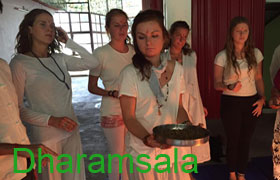Yoga Sutras Patanjali 11
26. A perceiving which is carried on interminably is the method of liberation.
Here we verge on the unadulterated Vedanta, with its discernment between the endless and the transient. St. Paul, trailing Philo and Plato, sets out the same elementary guideline: the things seen are brief, the things imaginary are limitless.
Yoga sutras of Patanjali methods something more than an educated consent, however this excessively is imperative. He has in view a steady discriminating in go about and additionally thought; of the two ways which present themselves for each deed or decision, dependably to pick the higher way, that which makes for the things unceasing: legitimacy as opposed to roguery, strength and not wispiness, the things of an alternate as opposed to one’s own, present and not indulgence. This correct insight completed always, makes for liberation.
27. The soul vision which is the last objective of liberation is sevenfold.
The sevenfold perception of the unworldly man, who stance onward discharged from psychic creel, is all the more completely parked onward in the later sutras. It is an awareness of the interminable, the euphoric, and the unadulterated. In the content, we are not told what the seven characteristics of this awareness are, so that for explanation we must have plan of action to the editorial. There we are told that the fleeting personality, not yet freed, has these seven attributes: to start with, the longing to know; second, the yearning to be free; third, and the longing of euphoria; fourth, the yearning to satisfy all Obligations; fifth, the nature of distress; sixth, the touch of dread; seventh, the chill loss of motion of mistrust. These are the shadows of the sevenfold cognizance, of the freed profound man, who, rather than the in the first place, has solidly created knowledge; rather than the second, acknowledged liberation; rather than the third, a profound and regularly expanding joy; rather of the fourth, the conviction that all obligations are satisfied: I have concluded the work which thou gravest dullness me to carry out; for the sixth and seventh, achievement, courage and the firm-set being of the Eternal.
28. From enduringly trailing the method of Yoga, until polluting influence is worn away, there comes the light of knowledge in full acumen.
Here, we enter on the more definite viable instructing of Patanjali, with its sound and radiant great sense. Also, when we come to detail the methods of Yoga sutras of Patanjali we ought to be astonished at their effortlessness. There is little that is abstruse in them. They are extremely commonplace. The being of the matter lies in doing them.The yoga teacher training in Rishikesh follows the yoga sutras in improving different yoga styles.
29. The eight method of Yoga are: the edicts, the Standards, right Poise, right Control of the life energy, Withdrawal, Focus, Meditation, and Illumination.
These eight methods are to be perused in their appeal. We can get a informed awareness of the first two, by contrasting them and the Commandments which must be obeyed by all great subjects, what’s more the Rules which are laid on the parts of religious requests. Until one has satisfied the in the first place, it is worthless to concern oneself with the second. Thus with all the method of Yoga they must be taken in their request. The yoga teacher training in Dharamshala offers teaches many types of yoga that relives from all health ailments.
30. The Commandments are these: no injury, truthfulness, declining taking, from contamination, from greed.
These five statutes are just about precisely the same as the Buddhist Commandments: not to murder, not to take, not to be blameworthy of incontinence, not to drink intoxicants, to talk the truth. Very nearly indistinguishable is St. Paul’s record: Thou shalt not commit infidelity, thou shalt not slaughter, thou shalt not take, thou shalt not desire. Also in the same soul is the response made to the Youthful man having extraordinary belonging, who asked, what I might do to be spared, and gained the answer: Keep the Commandments. This expansive, general preparing, which structures and improves human character, must be finished to an extremely extensive degree, before there could be much any desire for accomplishment in the further phases of profound life. Initially the psychical, and after that the profound initially the man, then the blessed messenger. On this expansive, altruistic and clever establishment does the system of Patanjali rest?




